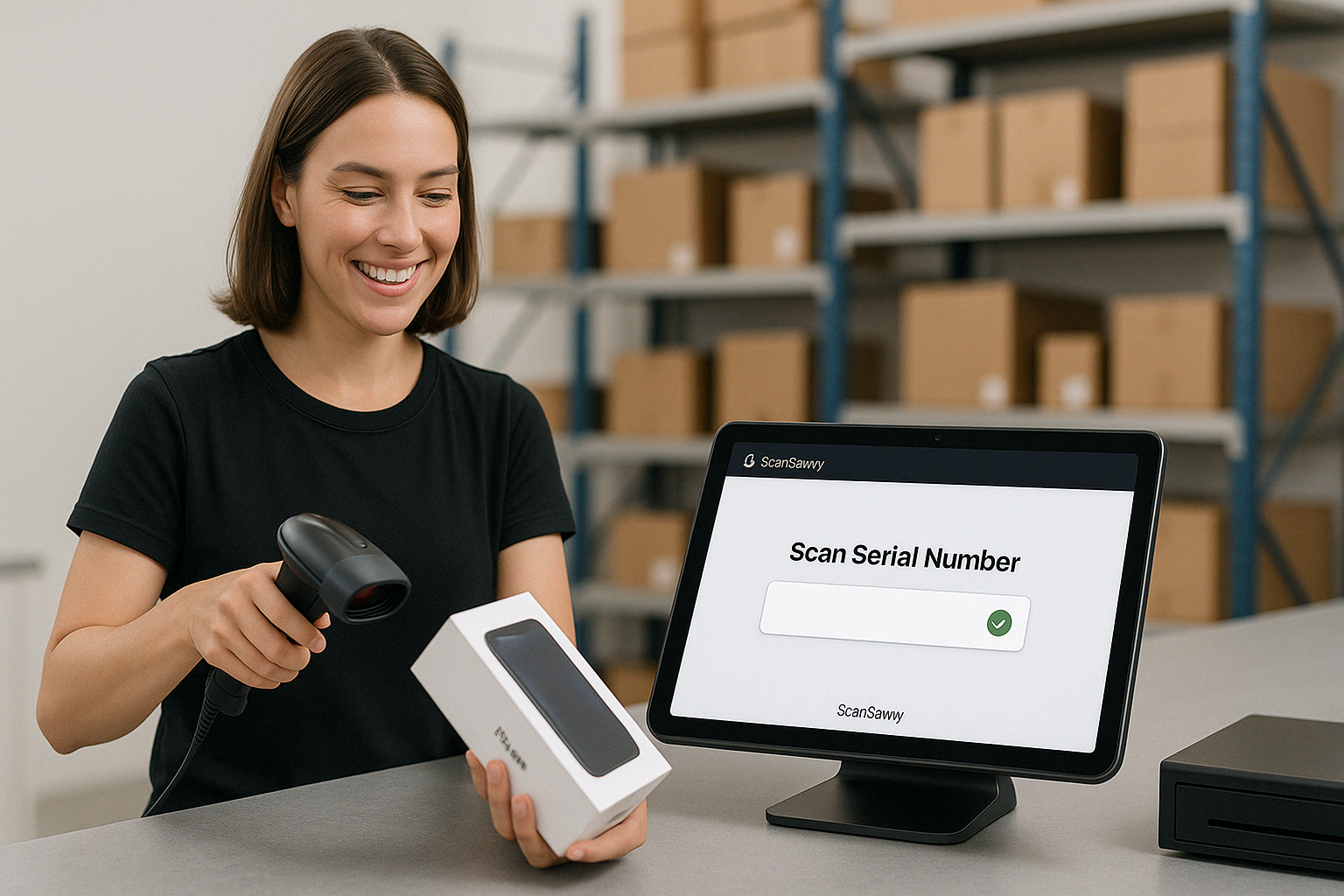Shopify Serial Number Tracking
Alex
4/21/2025
Mastering Shopify Serial Number Tracking for Ultimate Inventory Control
In the fast-paced world of ecommerce, inventory accuracy and traceability aren't just nice-to-haves; they're essential for profitability, customer satisfaction, and operational efficiency. For Shopify merchants, especially those dealing with high-value items, electronics, regulated goods, or products requiring warranty management, Shopify serial number tracking emerges as a critical process. But what does it involve, why is it challenging within the standard Shopify setup, and how can you effectively implement it? Let's dive in.
What is Serial Number Tracking?
Serial number tracking is the process of assigning a unique identification number to each individual unit of a product. Unlike SKU (Stock Keeping Unit) numbers, which identify a product type, or lot numbers, which identify a batch, a serial number is distinct to one specific item.
Think of it like a fingerprint for your products. Examples where serial numbers are crucial include:
Consumer Electronics: Smartphones, laptops, cameras (for warranty, returns, theft prevention).
Medical Supplies & Devices: Ensuring traceability for regulatory compliance and patient safety.
Luxury Goods: Watches, jewelry, high-end apparel (for authentication and anti-counterfeiting).
Automotive Parts: Tracking specific components for recalls or warranty claims.
High-Value Equipment: Industrial machinery, specialized tools.
The Challenge: Limitations of Native Shopify Serial Number Tracking
While Shopify is a powerful ecommerce platform, it doesn't offer built-in, dedicated functionality for tracking individual serial numbers out of the box. Standard Shopify focuses on SKU-level inventory counts. This creates several challenges for merchants needing granular traceability:
No Dedicated Fields: There isn't a default field to store or associate a unique serial number with each inventory item sold.
Manual Workarounds: Merchants often resort to cumbersome manual methods like spreadsheets, adding serials to order notes, or using tags. These are prone to errors, difficult to scale, and inefficient.
Association Difficulty: Linking a specific serial number to a specific customer order, return, or warranty claim becomes a manual, time-consuming task.
POS Gaps: The standard Shopify POS doesn't inherently support scanning and validating serial numbers during checkout or returns.
These limitations mean that true Shopify serial number tracking often requires leveraging third-party applications or developing custom solutions.
Why Shopify Serial Number Tracking Matters
Implementing a robust system for tracking serial numbers offers significant advantages:
Enhanced Accuracy & Accountability: Know exactly which unit was shipped to which customer, reducing disputes and improving warehouse accountability.
Efficient Returns & Warranty Management: Quickly verify if a returned item matches the one originally shipped and manage warranty claims based on the specific unit's history.
Anti-Theft & Fraud Prevention: Track stolen items and prevent fraudulent returns by confirming serial numbers.
Regulatory Compliance: Meet traceability requirements in industries like healthcare, food & beverage (when combined with lot/expiry), and electronics.
Recall Management: Isolate and manage product recalls down to the specific affected units, minimizing disruption and cost.
Improved Customer Service: Provide faster support by quickly accessing the history of a specific serialized item.
Advantages of Fully Integrated Shopify POS Serial Number Scanning Apps
The real power move for retailers is integrating serial number tracking directly into the point-of-sale experience. Specialized apps that enhance the Shopify POS system offer capabilities like:
Real-Time Scanning & Validation: Scan serial numbers during checkout or returns directly within the Shopify POS interface. The app can instantly validate the serial against inventory records.
Seamless Data Sync: Automatically associate the scanned serial number with the correct product and order in your backend system (often the inventory management app connected to Shopify).
Error Prevention: Prevent shipping the wrong item or accepting a return for an item not originally purchased by enforcing serial number scans.
Duplicate Scan Prevention: Avoid accidental double-scanning or fulfillment errors.
These apps bridge the gap left by native Shopify, making Shopify serial number tracking a seamless part of the retail workflow.
SKUSavvy is uniquely positioned to help Shopify stores who are looking to manage their serialized inventory. Paired with a Shopify POS extension enables you to sell serialized inventory directly on Shopify POS while depleting that serial number from stock on hand.
Use Cases for Shopify Stores
Serial number tracking isn't just for massive corporations. It provides tangible value across various Shopify store types:
Electronics Retailers: Essential for managing warranties, returns, and preventing fraud on items like phones, laptops, and accessories.
Jewelry & Luxury Boutiques: Authenticate high-value items, track specific pieces, and manage repairs or certifications.
Medical & Healthcare Suppliers: Crucial for FDA compliance (like UDI requirements) and tracking device history.
Wholesale & Distribution: Provide detailed traceability for B2B clients who may have their own tracking requirements.
Businesses Managing Warranties/Recalls: Any store needing to efficiently handle post-sale support based on individual units benefits immensely.
Beyond Serials: Connecting with Lot Numbers & Expiration Dates
For ultimate traceability, especially in regulated industries or for perishable goods, combine serial number tracking with lot/batch number tracking and expiration date management.
Lot Numbers: Track products made in the same batch, useful for quality control and targeted recalls.
Expiration Dates: Critical for food, beverage, cosmetics, and pharmaceuticals to ensure product freshness and safety (FEFO - First-Expired, First-Out).
Imagine tracking not just which specific unit was sold (serial), but also which batch it came from (lot) and when it expires. Advanced inventory management apps integrated with Shopify can centralize all this data, creating a complete traceability matrix from procurement to the end customer.
Conclusion: Elevate Your Shopify Store with Serial Number Tracking
While native Shopify has limitations, the need for granular inventory control through Shopify serial number tracking is undeniable for many merchants. It enhances accuracy, streamlines returns and warranties, deters theft, ensures compliance, and ultimately builds a more resilient and efficient operation.
Don't let manual processes hinder your growth or expose you to risk. Explore dedicated inventory management solutions and Shopify apps that offer robust serial number, lot, and expiry date tracking capabilities. Implementing effective Shopify serial number tracking is an investment in accuracy, customer trust, and long-term success.
People Also Ask
What is Shopify serial number tracking?
Tracking unique item IDs (e.g., serials/IMEIs) from receiving through fulfillment and returns on your Shopify store. Maintain clear logs for full tracebility when SKUSavvy and Shopify are combined.
Tie each unit to an order/customer
Assign, print, search, and scan serial numbers
Trace movement across locations
Does Shopify support serial numbers natively?
Not end-to-end—SKUSavvy adds full lifecycle serial tracking for Shopify stores.
Capture at receive, verify at pick/pack
Store serials with the order record
How does SKUSavvy track serials on Shopify orders?
SKUSavvy enforces scan-to-assign serial number and scan-to-verify so each shipment includes specific serials. Within the order logs each serial number within that order is displayed. SKUSavvy enables serial number scanning on Shopify POS.
Attach serials to line items
Scan serial numbers or select individual serial during pick
Auto-push fulfillment + tracking to Shopify
Can I import existing serial numbers into SKUSavvy?
Yes—bulk import via CSV or API for fast onboarding.
Map SKU → serial list with bin locations
Bulk upload during PO creation
Preserve historical notes if needed
How are serials captured during receiving?
Scan the item then the serial number on the product and allocate into a bin/location as inventory is checked in.
Validate against PO quantities
Scan serial numbers to enter valid data
Optional notes (condition/warranty)
Does serial tracking work across multiple warehouses/locations?
Absolutely—serials remain unique and traceable as they transfer.
Move requests retain serial identity
Original and post move retains serial number traceability
Global search and status
Can I print or scan serial barcodes from mobile?
Yes—use phone cameras or handheld scanners and print labels as needed just by tapping on the serial number anywhere in SKUSavvy.
Mobile-first workflows
Print serial numbers anywhere
Bin/product/serial labels
Can I see a serial’s full history?
Yes—search any serial to view where it’s been and which order/customer it’s linked to.
Timestamps for receive/pick/ship
Order specific traceability
User and location trail




